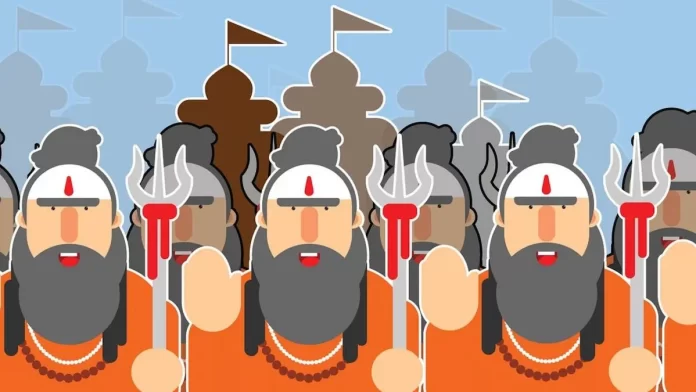The speakers at the Haridwar “Dharma Sansad” violated several of their constitutional and fundamental duties by advocating violence against minorities and the state. Read this to learn more.
Haridwar Dharma Sansad
Between December 17 and 19, 2021, some Hindu-Brahmin saints organized a “Dharma Sansad” or Hindu Religious Parliament in Haridwar, Uttarakhand.
In this religious conclave, some speakers pitched for a Rohingya-style genocide of Indian Muslims with the help of police, army, and other state authorities.
One of the recurring themes in their speeches was the threat posed by Islam to the Hindu-Brahmin-dominated socio-political setup of India.
The speakers at the impugned event even threatened the government with a massive 1857 style rebellion if it resisted the establishment of a Hindu-Rashtra and the genocide of Muslims from India.
According to the Hindu, the confidence with which the speakers amplified targeted hate messages against Muslims suggests an expectation of official patronage.
A Frontal Challenge to the Idea of India
Nevertheless, those deeply offensive utterances not only constitute a crime under the penal laws of the nation but also pose a frontal challenge to the idea of India as enshrined in the Indian constitution.
Through their naked advocacy of organized violence and rebellion against a group of Indians and State, the speakers and organizers of the so-called “Dharma Sansad” also violated several of their constitutional and fundamental duties as Indian citizens as contained in Part IV–A of the Indian Constitution.
Hate Speech and Fundamental Duties
Firstly, by advocating an 1857 style mutiny against the Indian state to establish a Hindu Rashtra, the speakers of the Dharma Sansad violated Articles 51A (a) of the Indian constitution that makes it a fundamental duty of all Indians to abide by the Constitution and respect its ideals and institutions.
Secondly, by threatening to undo the social fabric of composite culture and mutual co-existence of Indians of all classes, they also violated their constitutional duty to uphold and protect the sovereignty, unity, and integrity of India as is provided under Articles 51A (c) of the Indian Constitution.
In doing so, the speakers failed in their constitutional duty to value and preserve the rich heritage of the country’s composite culture.
Thirdly, by making attempts to subvert the democratic and secular traditions of the nation, they violated their constitutional duty to cherish and follow the noble ideals that inspired the national struggle for freedom as is provided under Article 51A (b).
Fourthly, the speakers by advocating organized violence against a group of fellow Indians failed in their constitutional and fundamental duty to promote peace and brotherhood amongst all classes of Indians.
Amish Devgan case and Hate Speech
Article 51A (e) of the Indian constitution makes it a fundamental duty of all Indians to promote harmony and the spirit of common brotherhood amongst all sections of Indians transcending religious, linguistic, and regional or sectional diversities.
Further, the Supreme court in its December 7, 2020 judgment in the Amish Devgan case held that hate challenge the unity and integrity of the nation by threatening the liberty and freedom of others.
The apex court observed that the Preamble to the Constitution consciously puts together fraternity, assuring the dignity of the individual, and the unity and integrity of the nation.
It held that the dignity of the individual and unity and integrity of the nation are linked, one in the form of rights of individuals and other in the form of individuals’ obligation to others to ensure unity and integrity of the nation.
Thus, the orators of hate speech at Haridwar also threatened the unity and integrity of the nation.
Fifthly, they also failed in their fundamental duty to develop scientific temper, humanism, and the spirit of inquiry and reform as is provided under Articles 51A (h).
Further, Article 51A (i) enjoins all Indians to safeguard public property and to abjure violence. The open incitement to violence by the organizers and speakers of the Dharma Sansad stood in clear violation of their fundamental duty.
Furthermore, Article 51A (j) of the Indian constitution enjoins all Indians to strive towards excellence in all spheres of individual and collective activity so that the nation constantly rises to higher levels of endeavor and achievement.
Conclusion
One must not forget that the Indian constitution declares India to be a socialist democratic republic. And it resolves to secure on all Indians liberty of thought, expression, belief, faith, and worship.
The organizers and speakers of the Dharma Sansad by advocating to overthrow the democratic and libertarian institutions of the country using violent means not only displayed great disloyalty to India and its constitution but also brought great shame to their countrymen.
Therefore, those in power would be well advised to check this growing radicalization before it develops into a Frankenstein monster out of control.
Those who are taking delight in advocating violence against minorities must not forget that they are also a minority and far less in number than Muslims when looked at from some other angles and perspectives like caste and class as rightly said by Paheli in class 12th NCERT textbook “Indian Constitution at Work“.
I am in minority in my locality but majority in the town, minority if you look at my and language but majority if you go by my religion… Aren’t we all minorities?
Chapter 2, Indian Constitution at Work, NCERT Class XII
